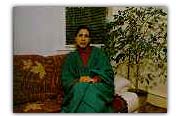Woman born in 1963
College Administrator
Self Identification: African American
Father's Racial Identity: African American
Mother's Racial Identity: European American
As an adult, I feel a lot of pride in coming from a biracial background, because you really do learn about these two worlds. And I think my parents constantly have given us [that] throughout our lives--knowing both families and having exposure continuously throughout adolescence to both worlds--so that there was always a comfort level in moving back and forth between these worlds. And they were very different settings. So now there's a lot of pride in that.

I think what's interesting now, and I don't know whether it's because of society's awareness of biracial people--African American people will sometimes ask me if I'm from a biracial parentage, because of the color of my skin. There's a lot more consciousness raising now. Or if I say I'm from a biracial background, people will say "Oh, yeah, I figured that." People are more astute in how they define this category that we call "African American."
And as a young child and as an adolescent, I definitely would not have said that I was proud. I was embarrassed. I would have said I didn't know what I was or how I defined myself or how other people defined themselves or how I did want them to define me. It was just a mess.
And I think now with my son, it's very interesting, because it's very important for me to know that he knows his parents and their backgrounds and where they're from and all that stuff. It's very important to me. And I think a lot of that is carried on through what my mother and father brought us up with and the exposure that they gave us.